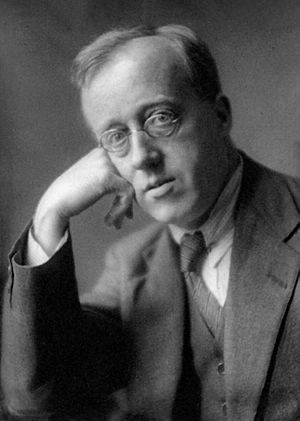I Vow to Thee, My Country facts for kids
I Vow to Thee, My Country is a famous British patriotic song. It was created in 1921 when a poem by Sir Cecil Spring-Rice was set to music by Gustav Holst. A patriotic song shows great love and loyalty for one's country.
History of the Song
The words, or lyrics, for this song come from a poem written by Cecil Spring-Rice. He wrote it in 1908 while working at the British Embassy in Stockholm, Sweden. The poem was first called Urbs Dei, which means City of God, or The Two Fatherlands. It was about how a Christian person has loyalty to both their home country and to heaven.
The first part of the poem, as it was first written, showed very strong feelings of patriotism. This kind of strong patriotism became less common after the First World War.
In 1912, Cecil Spring-Rice became the British ambassador to the United States of America in Washington, D.C.. An ambassador is a top diplomat who represents their country in another country. While he was ambassador, he tried to convince the American President Woodrow Wilson to join Britain in the war against Germany.
After America joined the war, Spring-Rice was called back to Britain. Before he left the United States in January 1918, he rewrote his poem. He changed the title to I Vow to Thee, My Country. He also made big changes to the first part of the poem. These changes were made to talk more about the huge number of British soldiers who died during the war.
The first part of the song talks about Great Britain and especially about those who died in the First World War. The last part of the song, which begins with "And there's another country," is talking about heaven. The very last line of the song is based on a line from the Book of Proverbs in the Bible.
Music of the Song
In 1921, the famous composer Gustav Holst created the music for the poem. He used a part of the music from Jupiter, which is one of the songs from his famous suite called The Planets. Holst made the music a bit longer so it would fit the last two lines of the first part of the poem. This musical part is often called Thaxted, named after the village where Holst lived for many years.
The song was first performed in 1925. It quickly became very popular, especially at ceremonies that remember soldiers who died in war, like Armistice memorial ceremonies.
Lyrics
- I vow to thee, my country, all earthly things above,
- Entire and whole and perfect, the service of my love;
- The love that asks no question, the love that stands the test,
- That lays upon the altar the dearest and the best;
- The love that never falters, the love that pays the price,
- The love that makes undaunted the final sacrifice.
- I heard my country calling, away across the sea,
- Across the waste of waters she calls and calls to me.
- Her sword is girded at her side, her helmet on her head,
- And round her feet are lying the dying and the dead.
- I hear the noise of battle, the thunder of her guns,
- I haste to thee my mother, a son among thy sons.
- And there's another country, I've heard of long ago,
- Most dear to them that love her, most great to them that know;
- We may not count her armies, we may not see her King;
- Her fortress is a faithful heart, her pride is suffering;
- And soul by soul and silently her shining bounds increase,
- And her ways are ways of gentleness, and all her paths are peace.
The middle part of the lyrics is usually not sung today. This is because it is not considered suitable for modern times.
Images for kids
-
"I Vow to Thee, My Country" is popularly sung at Remembrance Day services
See also
 In Spanish: I Vow to Thee, My Country para niños
In Spanish: I Vow to Thee, My Country para niños
 | William M. Jackson |
 | Juan E. Gilbert |
 | Neil deGrasse Tyson |




